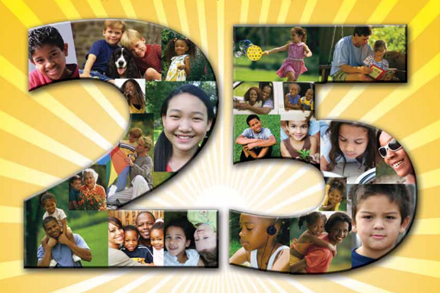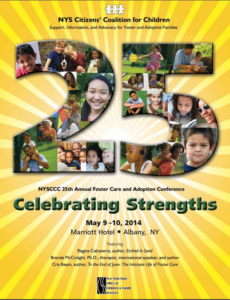25th Annual Foster Care and Adoption Conference
Thursday, May 9 – Saturday, May 10, 2014 • Albany Marriott
Celebrating Strengths; 2014 marked the Coalition’s 25th silver anniversary of hosting New York’s only statewide foster care and adoption conference for New York foster and adoptive parents, advocates, and professionals. Nationally known plenary speakers and workshop presenters shared their joy, insight, and expertise in 30 different workshops to encourage conference attendees to gain perspective, increase skills, appreciate the positives, and recognize and celebrate success. And, there were lots of opportunities to greet and meet old friends and new.
Thanks You to Our 2014 Conference Sponsors
The 2014 annual Coalition Statewide Foster care and Adoption Conference would not have been possible without the generous support of our conference sponsors. Here’s a list of 2014 conference supporters.
- The New York State Office of Children and Family Services – Premier conference partner and sponsor
- The Redlich Horwitz Foundation – Conference Scholarships for Foster and Adoptive Parents
- National Center for Child Welfare Excellence – General Conference support
- The Joseph LeRoy and Ann C. Warner Fund – Saturday luncheon anniversary celebration
- The Currie Family – Friday Luncheon Keynote Address
- The New York State Developmental Disability Planning Council – Scholarships for caregivers of children with developmental disabilities
- The Dave Thomas Foundation – Friday evening conference reception
- The Law Practice of John Zenir, Esq. – Legal workshop sponsor
- The Research Foundation for SUNY Buffalo Center for the Development of Human Services – Brochure & Program design and development
- The Morrison & Forester Foundation – 2014 Parent Group Raffle
- The Jewish Child Care Association – Friday morning coffee service
- Spence Chapin Services to Families and Children – Name tag/lanyard sponsor
- North Country Foster and Adoption Network – Lark Eschelman workshop
2014 Workshops, Handouts and Recordings
The following contains workshop descriptions and links to workshop handouts from the Coalition’s 2014 Foster Care and Adoption Conference. Audio recordings of the 2014 Conference workshop presentations can be ordered here.
See the 2014 conference program for complete presenter biographies.
1. Surviving Adolescence! – The ups and downs experienced by all adolescents can create havoc and conflict in the adoptive family. This workshop will help parents understand why this dynamic happens and will present simple, straightforward strategies to get through these years. Brenda McCreight
2. Communicating Cultural Competency – “If I can’t say THAT, what words should I use?” This workshop will explore identifying and understanding how culture and prejudice affect our ability to communicate effectively with others. Karen Kelley and Alicia Covey
3. Saying Goodbye: FP Separation and Loss Issues – Foster parents experience a sense of loss and grief when children in care leave their home. This workshop will prepare participants to deliver training for foster parents to work through and manage their unacknowledged grief. Kelly Varamogiannis
4. Needs, Wants, Wishes, and Dreams – Life can be stressful when your child is “labeled” as having a special need or disability. This interactive workshop will look at programs and various support services to bring parents some needed relief. Gary Shulman
- Services and Programs that Bring Relief to Caregivers Information Packet (pdf)
- Purchase Workshop Recording
5. It’s Not Just About Finding Families – Training families matters, but is not enough. Kids need education from experts outside the family prior to adoption placement and finalization to bridge the gaps in their experience. Jack Brennan
6. Dealing with Disruption – This workshop will provide an overview of why adoptions disrupt, the signs of a pending disruption, and strategies to help the child, the adoptive parents, and the adoption worker to grieve and to move on. Brenda McCreight
7. The Healing Power of Stories –
Children affected by trauma can be helped through accurate, reflective self-narratives. Explore research related to trauma recovery, healthy attachment, and narratives to develop the stories to tell in your own family. Nora McCarthy
8. Unpacking the “No” to Permanency – Facilitating permanency can be challenging work with teens at a crossroad between childhood and adulthood. This workshop will discuss the concept of permanency for older youth and explore options to meet their individual needs. Gary Mallon
9. Summertime and the Living Is Easy! – School is out, now what? Come hear about options and tips for locating and choosing summertime programs that provide positive summer experiences for kids with disabilities. Gary Shulman
- Camp Scholarship Info
- Contacts for Finding Camps
- Suggestions for Selecting Camps
- Low Cost Sleepaway Camps
- Sleepaway Camps for Special Needs
- Purchase Workshop Recording
10. What Do Americans Think About Foster Care Adoption? – Learn the surprising results of the National Foster Care Adoption Attitudes Survey commissioned and conducted by Dave Thomas Foundation for Adoption to shed light on what Americans do and don’t know, what they believe, and what impacts their willingness to take action. Carrie Boerio
- Access the National Adoption Attitudes survey online
- Purchase Workshop Recording
11. “Nothing About Me Without Me!” – This workshop will highlight challenges and opportunities for agencies to successfully engage youth and families across all child-serving systems. Explore core elements and skills related to family engagement and building mutual relationships. Sue Badeau
12. Attachment from a Parent’s Perspective – This workshop provides an examination of child and parent attachment styles and ways parents can aid a child’s healing. You will hear personal stories from a parent, with concrete examples of what works and what doesn’t when parenting children with trauma histories. Linda Finerson, Bobbi Petranchuk
13. Caring for LGBTQ Youth – Caregivers are responsible to meet the needs of children in their care. LGBTQ youth have the same needs as others, some specific to being LGBTQ, and often report they don’t have an adult to talk to. Explore how to provide needed support. Gary Mallon
14. The Power of Change Agents – Come and follow the amazing life and journey of a child in care as she encounters great social workers, foster parents, and other change agents that positively impacted her life. Participants will learn the importance of youth engagement, team collaboration, and taking care of oneself. Latasha Watts
15. Can Those Negatives Actually Be Positives? – Adoptive parent-pros discuss what we didn’t know, what we’ve learned, and how perceived negatives can actually be positives. It’s all about changing culturally engrained perceptions and the consumer mentality. Rich Buley-Neumar and Joanne Ferrante
16. Recovering from Hazardous Parenting – Participation in this workshop is reserved for parents who have raised children with severe behavior disorders and are seeking ways to recover from years of unrelenting stress. Explore challenges and strategies to help parents reclaim their lives. Brenda McCreight
17. Help, I Think My Child Needs to Be in Foster Care – What are the legal options for parents who fear their children can’t live safely at home, but are not getting help from the mental health system. A look at the situation when a parent wants the local district to provide out of home care via a PINs proceeding or a voluntary placement – or even a surrender. Margaret Burt
18. Parenting a Parenting Teen – When your teen becomes a parent, it might seem like your life has turned upside down. What you can do to help yourself adjust and support your teen? When it comes to the baby, who is the parent and who is not? We will talk about the complicated, and fun, issues that arise and how to address them. Joan Siegel
19. Adoption from a Distance – Learn what kids have taught us! A look at lessons learned about successful practices and decision making from years of intensive long-distance placements of teens and older youth into adoptive families. Maris Blechner
20. Behind the Closed Door – This workshop will discuss barriers that searching adoptees face and the challenges for agency staff who believe in adoptees’ right to their original birth certificates, but must conform to closed-record laws. Lisa Maynard
21. Accessing Mental Health Services – “What does my child need, what should I ask, where should I go, and what should I expect when I get there?” An experienced therapist will provide answers to these questions and tips for locating services to help children overcome trauma and attachment issues. Lark Eshelman
22. Freeing a Child for Adoption Through TPR – This workshop will provide a discussion of the legal grounds for termination of parental rights, including how the court proceedings work, potential suspended judgments, and appeals. It will also include an overview of the rights of foster parents and relatives. Margaret Burt
23. Fear and Control – The dynamics of fear and control can threaten partnerships in child welfare. Strategies to address these issues and strengthen partnerships will be identified. Diana Shultz
24. Answers to Questions All Foster/Adoptive Parents Have – Get expert answers to your submitted questions and other FAQs. Topics covered will include helping children overcome loss; helping families deal with anger, sadness, and disappointment; and parenting tips for more effective communication. Jeff LaCure
25. Finding the Right Words – It isn’t always easy to know what to say and when to say it when facing difficult questions about a child’s adoption. This workshop provides strategies and guidelines for both parents and professionals to talk with children about their adoption and birth history. Beth Friedberg and Dawn Heyward
26. What You Should Know About Sensory Processing Disorder – Come and learn how sensory integration can explain and treat the unusual behaviors of a child with a traumatic background. Lark Eshelman
27. Having a Voice and a Choice: Legal Options for Kin and Fictive Kin – What are the options for friends and relatives when a child is removed from his or her family? How do you make a good decision about which option is best? Margaret Burt
- Workshop Powerpoint Slides
- Dale P. Terminations. TPRs/Adoptions for Children Under Article 10 Custody Orders
- Optional Language to Consider for Article 6 /V Docket Custody Orders And Traditional or Subsidized Guardianship Orders that Resolve Article 10’s
- Purchase Workshop Recording
28. Parenting the Absent Child – How do you remain committed to a child who is hospitalized, incarcerated, or a chronic runaway? What does commitment look like when the child keeps telling you they don’t want to be adopted and everyone keeps telling you to let go? Real-life experiences and tools for parenting the reluctant and/or out-of-home child. Mary Chancie and Denise Royal.
29. Parent Group Cracker Barrel: Three Sessions in One! – Come learn from the experts! Parent group leaders from across the state will provide hands-on strategies your group can employ to inform and support foster and adoptive parents in your community.
30. Fostering Fatherhood: The Forgotten Role – Foster fathers are often not given the same recognition that foster mothers receive, yet their role can be crucial in the lives of children in care. This workshop will examine why and how foster fathers can have a powerful effect on children in care and their families. Jack Fuentes.
Make sure you sign up for the Coalition’s Newsletter to receive important updates on the upcoming Conference.
Support the Coalition though membership or donations and help us continue this important work.
Want or need more information? Contact us at info@affcny.org or call our main office at (646) 688-4321.


